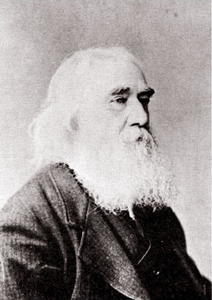Liberty Matters
Realism and Reference

Randy says: “The activity of determining the communicative content at the time of enactment ... is empirical, not normative.” This is the nub of our disagreement. If we adopt (as I think we should, and as I think Spooner implicitly does) both a realist theory of reference and a realist theory of normativity, then determining communicative content will in many cases be a normative enterprise.
And here I am indeed talking (in Randy’s terms) about interpretation, not just construction – that is, I’m talking about what the text of the law means, irrespective of whether it should be applied. (Incidentally, I take Matt’s option 3 to describe Spooner’s approach to interpretation, not his approach to construction, which I would take to be closer to Matt’s option 2.)
I agree with Randy that “words have an objective social meaning at any given time that is independent of our opinions of that meaning.” In the dictum of Hilary Putnam, one of the founders of the realist theory of reference, “‘meanings’ just ain’t in the head.”[72] But Putnam wasn’t just saying that the meaning of words isn’t determined solely by the psychological states of any individual speaker; rather, his point was that such meaning isn’t determined solely by the psychological states of society at large either.
Recall from Greek mythology the story of Oedipus. As king of Thebes, Oedipus issues a decree that whoever killed the previous king, Laius, must be punished. Oedipus initially has no idea – nor does anyone else – that he himself is the killer (and incidentally the son) of Laius; he remembers Laius only as a quarrelsome stranger he came to blows with on the road years ago.
Does Oedipus’s decree mean that Oedipus himself should be punished? (I’m asking about what the decree means, i.e., what implementing it would involve, not about whether it should be implemented.) Surely it does. Yet not only did Oedipus not intend his own punishment, but no one to whom the decree was promulgated took it as calling for Oedipus’s punishment.
The moral of this example is that what Oedipus’s decree means is determined not solely by anyone’s psychological states (either the enactor’s or the general populace’s), but rather by those psychological states together with the fact that Oedipus really did kill Laius.
What determines which person the phrase “the killer of Laius” refers to? Of course the psychological states of the people using the phrase, as well as of the general society in which the phrase is used, are part of the story; sounds or marks by themselves don’t mean anything. But those psychological states generate a reference only with the help of external reality, because those using the phrase “the killer of Laius” intend to refer to whatever person, known or unknown, is actually the killer of Laius. Thus if all the Thebans were mistakenly convinced that Laius had been killed by his wife Jocasta, “the killer of Laius” would still refer to Oedipus, not to Jocasta. Mind-independent facts of reality, including facts not generally recognized, play a part in determining what people’s words mean.[73]
Now in this case, determining that the decree requires Oedipus’s killer’s punishment will indeed be a matter of empirical inquiry – not just inquiry into the psychological states of the Theban populace, however, but inquiry into what actually happened to Laius on the road years ago.
But sometimes the terms whose interpretation is at issue are normative. For example, the text of the Fifth Amendment calls for “just compensation” – which means not “compensation we think is just” or “compensation generally thought to be just,” but “compensation that is actually just.” And just as “the killer of Laius” refers to Oedipus even if everyone thinks it refers to Jocasta, so “just compensation” refers to whatever compensation is actually just, even if everyone thinks some other compensation is what’s just.
The communicative content of normative phrases like “just” – or “due” – makes itself hostage to the real, possibly unrecognized nature of justice, just as the communicative content of “the killer of Laius” makes itself hostage to the real, possibly unrecognized facts about what happened to Laius on the road. The difference is that figuring out what happened to Laius on the road is an empirical enterprise, whereas figuring out the nature of justice requires normative reasoning.
Of course this analysis assumes that there are objective facts about justice, in the same way that there are objective facts about who killed Laius. But this is just what Spooner does assume, since he describes justice as a “natural principle” that “can no more be changed” than “the law of gravitation” or “the principles of mathematics.”[74]
If we agree (as I think we should) with the reference realists that unrecognized facts can play a part in determining what our words refer to, and if we agree (as, again, I think we should) with the moral realists that those unrecognized facts can include facts about justice, then Spooner’s interpretation of the fugitive-slave clause becomes much more defensible.
Endnotes
[72.] Hilary Putnam, “Meaning and Reference,” p. 704; in Journal of Philosophy 70 (1973), pp. 699-711.
[73.] For elaboration, see my working paper “Inside and Outside Spooner’s Natural Law Jurisprudence,” available online at: <https://praxeology.net/Spooner-OB.doc>.
[74.] Lysander Spooner, Natural Law: Or a Treatise on Natural Law, Natural Justice, Natural Rights, Natural Liberty, and Natural Society; Showing That All Legislation Whatsoever Is an Absurdity, a Usurpation, and a Crime, Part First (Boston: A. Williams, 1882), p. 11. Online: </titles/2182>.
Copyright and Fair Use Statement
“Liberty Matters” is the copyright of Liberty Fund, Inc. This material is put on line to further the educational goals of Liberty Fund, Inc. These essays and responses may be quoted and otherwise used under “fair use” provisions for educational and academic purposes. To reprint these essays in course booklets requires the prior permission of Liberty Fund, Inc. Please contact oll@libertyfund.org if you have any questions.